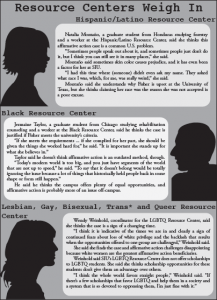Old action gets new court case

October 17, 2012
National court case brings up varied opinions on affirmative action
Affirmative action has become a recent issue in the United States.
A case that has been before the Supreme Court since Oct. 10 about reverse racism has brought affirmative action to the nation’s attention. Affirmative action refers to policies that consider factors such as race, color, religion, gender, sexual orientation or national origin to benefit underrepresented groups in areas of employment, education and business.
Advertisement
Some students and staff at the university have mixed opinions on the matter.
In the court case Fisher v. the University of Texas, plaintiff Abigail Fisher claims she was denied undergraduate admission to the university because she is white.
The University of Texas is not alone in dealing with affirmative action cases. Other universities across the country have had issues with the topic, including SIU.
In 2005, SIU was threatened with a lawsuit by the Department of Justice because three university-offered fellowship programs allegedly discriminated against males, non-preferred minorities and whites.
SIU agreed to change the programs, and the lawsuit was dropped, according to the Leadership Conference website. SIU decided to encourage more diverse populations to participate in the fellowship programs, which consisted primarily of underrepresented minorities and women.
While affirmative action is being discussed at the national level, many students and faculty at SIU weighed in on the matter.
Affirmative Action at SIU
Advertisement*
Linda McCabe Smith, associate chancellor for institutional diversity, said she does not think race is the only issue in the Fisher case.
Smith said she has been the head of the affirmative action office for almost five years.
“We have not had (affirmative action) complaints since I’ve been in this office,” she said.
She said she thinks all students have equal success opportunities at the university no matter their race.
Affirmative action is not an outdated philosophy, Smith said.
“It’s maybe not the best we have, but it’s what we have in place to ensure firm action is taken to make sure people have equal opportunities,” she said.
Smith said most people do not understand affirmative action.
“It’s not about one’s (skin color),” she said. “It is about being qualified, and a lot of individuals sometimes misinterpret that as saying you are getting someone in that is not qualified for a position, and that’s not the case.”
Smith said all individuals, no matter their race, are accepted to the university if they meet criteria. She said affirmative action is not about the numbers.
“It’s not about quotas,” she said. “That’s a misconception. That’s outdated.”
Student Input
“I think a lot of people automatically assume that (Hispanics) have it easier because (we’re minorities),” said Candis Nikolic, a graduate student in social work from Chicago and a worker at the Hispanic/Latino Resource Center. “We have it a little bit harder.”
Nikolic said most Hispanics come from primarily Spanish-speaking households, and some Hispanics have problems getting their children into universities because they are either unaware of the process or are migrant workers.
“For us, it’s a huge accomplishment just to go to college,” she said. “We don’t look at it like it’s just an easy thing to do. If anything, we look at it as if it is more difficult, and that’s why most people are intimidated even to do it (in Hispanic culture).”
Braden Barton, a freshman from Oregon studying cinema and photography, said he has seen that bigger universities are in search of students from particular groups.
“It has been alarming to me when I was doing my college research on how easy it was for … different cultures (to) automatically (be given) more money because they need a certain amount of numbers (of minorities) in their schools.“
Barton said he thinks Fisher is correct in taking a stand against the University of Texas.
He said he thinks whites have a disadvantage because minorities have access to scholarships only available to their respective ethnic groups.
Zachary Tockstein, a sophomore from Metropolis studying art, said Fisher’s admittance should have been based on her high school transcripts.
“If it is purely because of (Fisher’s) race, that wouldn’t make sense,” he said. “If (the case) is just because of her race, that’s terrible.“
Tockstein also said he does not think race is as much of an issue at SIU as other places he has been.
Advertisement







